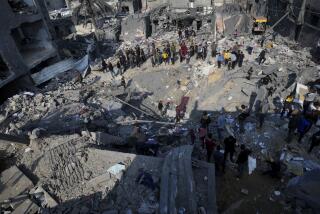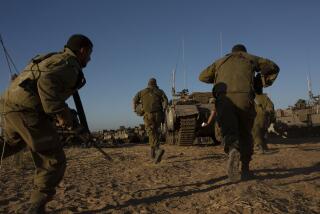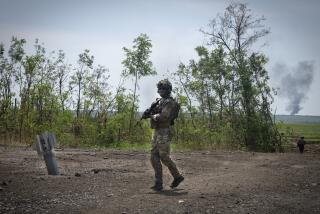PERSPECTIVE ON THE GULF WAR : Force Iraq Out of the Sand Bunkers : The allies must fight highly mobile, flanking battles on the ground--a lesson from Israel’s wars against Arab armies.
- Share via
TEL AVIV — The liberation of Kuwait by force cannot be accomplished by air bombardment alone. Unless Saddam Hussein declares that he will withdraw from Kuwait unconditionally, the U.S. Army and Marines will have to join the fight. Anything short of an all-out ground assault, once the land battle has begun, would be a mistake. Any smaller battle can only end in stalemate, and from the standpoint of Hussein and the Arab masses it would be seen as a victory against a “Great Satan” and its mighty military coalition.
The question facing the allied generals is not just when to start, but how best to conduct the ground battle to get it over as quickly as possible.
There is no harm in sustaining the air offensive for now. A further softening of Iraqi forces, especially the Republican Guards, will make things easier for ground forces when the time comes. According to Soviet combat doctrine (and the Iraqis were trained by the Soviets), a unit that has lost 50% of its force--meaning its armor more than its soldiers--can no longer be counted as a consolidated fighting unit. But judging by the success rate of bombardments in Kuwait so far, it is doubtful that this target can be reached in two weeks. After that, the war risks spilling into hot, humid weather and Muslim holy days.
Most worrisome in a ground war will be Iraq’s dug-in tanks and artillery, capable of causing great casualties. There is a limit to what conventional softening bombardments from the air can achieve against these well-dug-in forces. At the same time, however, the decisive air superiority of the allies will put Iraqi armor at risk the moment it moves out of its desert fortifications. Ground battles require commanders to be able to concentrate their forces, but any Iraqi attempt to move tanks into new positions will expose them to allied attack helicopters and fighter planes. This is the most glaring Iraqi disadvantage on the ground, sharply illustrated when the second wave of the Iraqi attack on Khafji, Saudi Arabia, collapsed under air attack.
The allies must therefore draw the Iraqi armored units out of their shelters and sand bunkers and force them into mobile battle.
The Israelis, in their wars against Arab armies, resolved this problem by quick maneuvering, threatening the rear and the flanks of enemy forces and mounting several simultaneous threats against vital targets. This is a classic indirect approach, and it prevented the Arab forces from making full use of their armored power. It was the quick maneuvering that crushed them, perhaps more than Israeli firepower.
The allies arrayed against Iraq have an important advantage that Israel lacked--modern fighter-helicopters and precise guided weapons. For the first time, thanks to the fighter-helicopters, anti-tank fire is tremendously mobile. This gives the allied forces a great maneuverability advantage, provided ground forces are well-coordinated.
To cut casualties and make maximum use of the allies’ advantages, they should at all costs avoid full frontal assaults and make more use of mobile flanking maneuvers. The armored forces should be first in, in coordination with highly mechanized infantry units. The Marines, despite their toughness in hard ground fighting, should not take on major breakthrough missions, again in the interest of denying Iraq a high casualty toll and thus an indirect victory. Allied casualties must be also be kept low to prevent even the consideration of using tactical nuclear weapons.
To threaten a number of vital Iraqi objectives simultaneously, it will be necessary to maneuver on Iraqi territory. This does not mean that allied forces should necessarily be directed toward Baghdad. But heavily armored Republican Guard forces are deployed in the Karbala region between Baghdad and Kuwait and could not be forced into the open if operations were limited to Kuwait.
The most troublesome problem for the allies, however, is Kuwait city. If Saddam Hussein were to order a number of special force divisions and paratroopers to entrench themselves in the city and oblige the Americans to fight there, it could become a smaller version of the bloody World War II battle for Stalingrad. It probably matters little to the Iraqis if the city is destroyed and its inhabitants blown to bits. But armies that experienced door-to-door fighting in World War II are anxious to avoid fighting in built-up areas where they cannot bring in tanks and other large armored vehicles.
The Iraqis want to drag the allies into the city, and if that happens, the Marines and other infantry will be critical to this part of the battle. But if allied ground commanders can be patient enough, they can encircle the city and wait until the Iraqi troops are starved out, or until they surrender.
More to Read
Sign up for Essential California
The most important California stories and recommendations in your inbox every morning.
You may occasionally receive promotional content from the Los Angeles Times.













